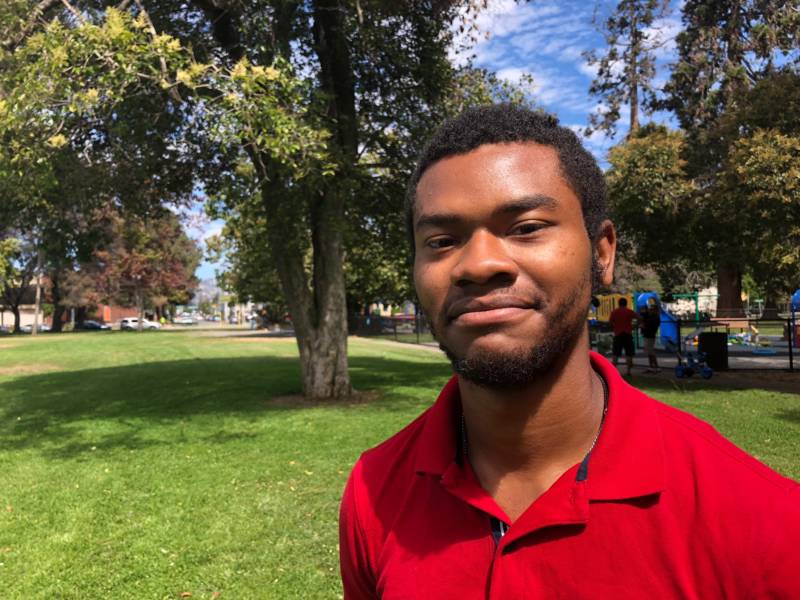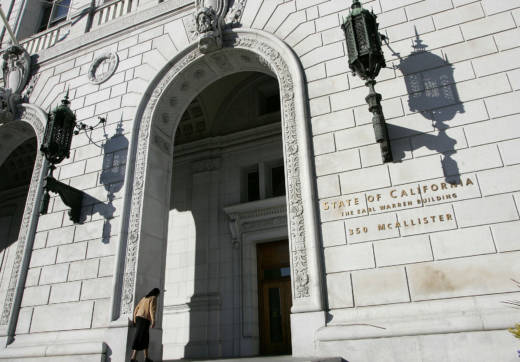Tre’Vonn Doakes said that, a year and a half ago, his life was on the right track. In his early 20s, he had a good job working for Alcatraz Cruises. He was taking college courses, providing for his two young daughters and had another baby on the way.
Then on April 21, 2017, Doakes said he came close to losing everything he cared about. He got in a fight with a family friend who came to his house, and when Doakes called the Oakland Police Department, he ended up getting arrested.
“They charged me with two counts of assault with a deadly weapon and one count of domestic violence,” Doakes said.
He said he sat in a holding cell in Santa Rita Jail for 12 hours, worrying about his fiancee and his daughters.
“It’s everything that I was fighting to keep,” he said.

Meanwhile, Doakes’ dad was trying to get him out of jail. Doakes said Aladdin Bail Bonds agreed to sign a $75,000 bond in exchange for the 10 percent fee that bail companies charge to guarantee a defendant shows up to court.
But Alameda County prosecutors never filed charges against Doakes, and he said he never had to go to court.
“So why am I having to pay a bail bond?” Doakes wondered.
As far as the law is concerned Doakes is free and clear of any criminal case. But more than a year later, he said he is still struggling to pay back the $3,000 he owes Aladdin.
If Senate Bill 10, the new bail reform law signed by Gov. Jerry Brown, goes into effect next year, people like Doakes won’t have to pay a bail company to get out of custody, but they won’t necessarily be released either. The new law gives judges a lot of discretion to determine whether a defendant can safely be released pending trial.
There is broad agreement among state and criminal justice leaders that the money bail system in California is unfair and often unconstitutional, but there is disagreement about whether the system under the new law complies with the state constitution.
“It’s directly in contradiction to the fundamental rights protected by the U.S. Constitution and California [constitution] Article 1 Section 12,” San Francisco Deputy Public Defender Chesa Boudin said.
Boudin is currently arguing a case before the California Supreme Court that could have far-reaching implications for how — or whether — the new state law is implemented.
The case of Kenneth Humphrey, whose win before a state appeals court in January upended California’s reliance on unaffordable bail amounts to keep defendants in jail awaiting trial, is pending before the state Supreme Court. The state’s highest court initially took up the issues raised in Humphrey’s case to determine under what circumstances a defendant can be jailed — with no chance to bail out — before he or she has been convicted of a crime. The court also asked whether judges can consider public safety in setting bail amounts.
Earlier this month, the Supreme Court requested additional arguments on how SB 10 affects the issues in Humphrey.
Boudin says that according to Article 1 Section 12 of the California Constitution, there are only three sets of circumstances in which a defendant can be held before trial.
A person shall be released on bail by sufficient sureties, except for:
(a) Capital crimes when the facts are evident or the presumption great;
(b) Felony offenses involving acts of violence on another person, or felony sexual assault offenses on another person, when the facts are evident or the presumption great and the court finds based upon clear and convincing evidence that there is a substantial likelihood the person’s release would result in great bodily harm to others; or
(c) Felony offenses when the facts are evident or the presumption great and the court finds based on clear and convincing evidence that the person has threatened another with great bodily harm and that there is a substantial likelihood that the person would carry out the threat if released.
But San Francisco District Attorney George Gascón is arguing that the constitution isn’t that restrictive.
“When Article 12 was originally passed back in the late 1800s, all felonies were capital offenses,” Gascón said. “The world has evolved tremendously, and there are many cases where you have felonies that are not capital offenses, and they are not necessarily dangerous.”
There are also many other crimes that are no longer capital offenses, he said, but are very dangerous. Gascón argues that another provision of the constitution — Article 28 — lets judges more broadly consider the danger a defendant could pose when deciding to release or hold someone before trial.
